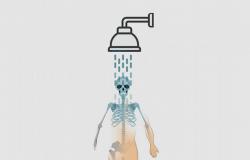
The elections to renew the composition of the European Parliament showed this Sunday a marked advance of the extreme rightespecially in France and Germany, where this trend exceeds the parties in power according to the first estimates.
Tens of millions of Europeans, from Portugal to Lithuania, voted this Sunday to elect their representatives to the European Parliament.
The 27 member countries of the European Union chose 720 seats in the European Parliament (15 more than the current 705) and more than 370 million people were called to the polls. Each country distributes a proportional part of the seats based on its population. Germany (96), France (81), Italy (76) and Spain (61) are the countries that contribute the most European parliamentarians, while Malta (6) or Luxembourg (6) contribute the least.
The election of MEPs opens a new cycle in the blocand the new legislators will appoint who will preside over the European Commissionthe executive arm of the EU.
In France, exit polls showed that The far-right National Agrupation party obtained more than 30% of the voteapproximately double that of the liberal coalition launched by President Emmanuel Macon.
The French far-right candidate Jordan Bardella28, immediately called on Macron to call early legislative elections, shortly after the Elysée announced an appearance by the president on Sunday night.
In Germany, the EU’s largest economy, exit polls indicated that the head of government’s social democratic party, Olaf Sholzobtained the worst result in its history and was relegated to third placebehind the right and the extreme right.
According to polls carried out for public television, the conservative alliance (CDU-CSU) would receive between 29.5% and 30% of the votes. The far-right AfD party comes in second with around 16%, and Scholz’s SPD party comes in third with 14%.
Germany is the country that will elect the largest number of Eurolegislators, 96, followed by France (81), Italy (76) and Spain (61). Malta, Luxembourg and Cyprus choose 6 each.
In Austria, exit polls put the far-right FPO party in front, with around 27% of the vote.
According to exit polls in Greece, the Prime Minister’s conservative party Kyriakos Mitsotakis leads the results ahead of the leftist movement Syriza and the socialist Pasok party.
In the election held on Thursday in the Netherlands, an alliance of the center-left and the Greens defeated the far-right PVV party by a minimal difference.
EU-wide projections indicate that The European People’s Party (EPP, right) bloc will continue to be the strongest in the European Chamberfollowed by the Socialists & Democrats (S&D, social democrats) group.
While, The Renew Europe bloc (Renew, centrists and liberals) should remain the third most importantalthough weighed down by the advance of the right and the extreme right.
Polls indicate that far-right parties could win up to a quarter of the seatsto the point of threatening the Greens bench.
The far-right political family is divided into two blocks, but a clear demonstration of force would position them as unavoidable interlocutors in the decision-making process.
On one side, there is the Conservatives and Reformists (ECR) bloc and on the other, the Identity and Democracy (ID), separated by their position on the EU itself.
The far right shows its muscles
The current president of the Commission and candidate for a new five-year term, the German Ursula von del Leyenbelonging to the EPP, voted on Sunday morning in the town of Burgdorf, in Lower Saxony.
Von der Leyen opened the door to specific alliances with the far-right group of the Italian prime minister, Giorgia Meloni.
In Spain, voters’ support for the EU remains high – 67% are favorable, according to the latest Eurobarometer survey – perhaps because they associate the modernization of the country after the Franco dictatorship (1939-1975) with joining the bloc.
In just over a year, Spain has held municipal, regional, national and now European elections, and each one has the flavor of revenge for the previous one, among the socialists of the President of the Government, Pedro Sanchezand the conservatives of the Popular Party (PP), led by Alberto Núñez Feijóo.
“It is important that with our vote we decide if we want a Europe that advances or a Europe that goes backwards. And I hope it is the first, rather than the second,” said the president of the Spanish government, Pedro Sánchez, after voting.
By 16 GMT, voter turnout in Spain was approximately 38.3%, well below the 49.4% that had been recorded at the same time five years ago.
Another country where the far right must obtain a solid result is Hungary. “I hope that a majority favorable to peace will emerge from these elections,” declared the prime minister, the nationalist Viktor Orbanafter voting in Budapest.
Orban’s Party, Fidesz, has approximately 50% of voting intentions, and in second place is the opposition party Tisza, with about 27%.
In neighboring Poland, a voter, Andrzej Zemiejewskia 51-year-old doctor, assured, after voting in Warsaw, that his most pressing concern is the reinforcement of “security”, given the proximity of his country to the scene of the war between Russia and Ukraine.
Socialists, liberals and greens, open to supporting the EPP if it does not give in to the extreme right
The social democratic, liberal and Green groups in the European Parliament showed their willingness to unite this Sunday to a pro-European coalition with the European People’s Party (EPP) if it does not make concessions to the ultra-conservative groups (Conservatives and Reformists) and the extreme right (Identity and Democracy).
The vice president of the social democratic group in the European Parliament, the Portuguese Pedro Marques, stressed that the result “clearly” points to a pro-European democratic majority and stressed that his group will be key to ensuring that said majority is achieved again.
”We can build a pro-European democratic majority, in favor of the rule of law, and that is why we will fight in the coming months. Trying is not only in our hands. “We want (there to be) no ambiguity regarding the extreme right,” said Marques, who stressed that, beyond policies, his condition for supporting the EPP candidate for the European Commission will be to rule out alliances with these ultra-conservative and extreme right groups. .
Also the head of the list of the European liberals, the French Valérie Hayer, claimed that her political family will be necessary to be able to maintain a pro-European majority in the European Parliament, despite the fact that the first polls suggest that they would lose a fifth of their representatives.
(With information from AFP and EFE)





